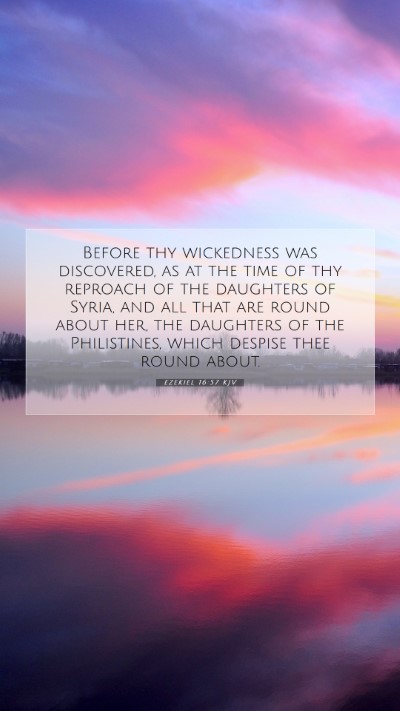Ezekiel 16:57 - Commentary and Explanation
Ezekiel 16:57 serves as a pivotal verse within a wider narrative of God's relationship with Israel, reflecting themes of sin, judgment, and grace. To understand its meaning, we draw insights from multiple public domain commentaries, which help elucidate its significance in both historical and theological contexts.
Verse Context
The context of Ezekiel 16 is crucial for comprehending its message. This chapter employs vivid imagery to describe Jerusalem's unfaithfulness to God, akin to an adulterous wife who has abandoned her covenant with her husband. The warning in verse 57 encapsulates the consequences of such betrayal, emphasizing God's judgment.
Insights from Commentaries
-
Matthew Henry:
Henry highlights that this verse speaks to God's judgment upon Jerusalem for her spiritual infidelity. He notes the seriousness with which God views the covenant relationship, framing Israel's idolatry as a grievous act of betrayal. Henry's insights emphasize the necessity of repentance and the dire consequences of turning away from divine guidance.
-
Albert Barnes:
Barnes provides a more detailed look at the implications of the verse, discussing the idea of shame associated with Jerusalem’s actions. He points out that the city’s past glories are rendered null by her sinful state, illustrating the stark contrast between what was intended for Israel and what they chose instead. Barnes underlines the theme of divine retribution that is prevalent in the prophetic writings.
-
Adam Clarke:
Clarke’s commentary delves into the historical context of Ezekiel's audience. He interprets the verse as a stark reminder of the nations surrounding Israel who will delight in her downfall. Clarke asserts that God's punishment serves not only to chastise but also to demonstrate His sovereignty over all nations, victoriously contrasting false gods with the true God.
Theological Implications
Theologically, Ezekiel 16:57 invites readers to reflect on the nature of divine judgment and mercy. It compels an understanding of how God responds to unfaithfulness and encapsulates the call to return to a covenant relationship. The insights from the commentaries converge on the importance of recognizing sin, understanding its consequences, and responding to God's ultimate grace.
Application to Daily Life
Applying the message of Ezekiel 16:57 to contemporary life means recognizing our own vulnerabilities to spiritual apathy and idolatry. It calls believers to examine their own faithfulness in their relationship with God and the seriousness of straying from His ways. The verse serves as a warning and a call to maintain devotion, humility, and the earnest pursuit of righteousness.
Additional Cross References
- Hosea 1:2: Discusses the unfaithfulness of Israel.
- Isaiah 54:5: Refers to the Lord as a husband to Israel.
- Jeremiah 3:20: Illustrates Israel's betrayal as a wife’s betrayal of her spouse.
- Revelation 17:1-2: Describes the judgment of the great harlot, symbolizing unfaithfulness.
Conclusion
In summary, Ezekiel 16:57 is rich in meaning and extends insights that are relevant for Bible study groups, online Bible study, and individual exploration of scripture. The commentaries reflect the depth of this verse, encouraging deeper study and personal reflection. Understanding such verses enhances Biblical exegesis and provides valuable Bible study insights that can transform lives.
Keywords Overview
This analysis incorporates keywords like Bible verse meanings, Bible verse interpretations, and understanding Scripture, which cater to individuals seeking deeper understanding and commentary on difficult passages. The content serves as an enriching resource for exploring the biblical texts thoughtfully and practically.


